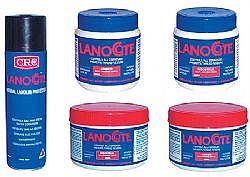CRC LANOCOTE is a unique anti-corrosive coating based on lanolin or wool grease that was developed here in LanoCote offers natural lanolin protection and works on five basic principles: it displaces water, absorbs corrosion, penetrates, forms a moisture barrier and has high lubricity (slipperyness), protecting metals from the corrosive effects of salts, alkalis and acids. Lanolin’s unique characteristics are transferred to any hydrocarbon lubricant added to it and CRC’s addition of hydrocarbon lubricant, non-toxic inhibitors and special spreading agents makes LanoCote so unique it was granted a US patent in 1985. The development of LanoCote began in 1979 when a Kiwi noted that the majority of American cruising yacht crews used basic, unmodified lanolin to combat all types of boat electrolysis and corrosion with outstanding success. Continued research and testing has resulted in two basic grades of LanoCote – Amber Grade and Industrial Grade. LanoCote Amber Grade has proved adequate for the majority of situations which involve thread, screw and rivet type fasteners and prevents electrolysis between dissimilar non-ferrous metal threads or fittings. It is almost invisible once applied and is ideal on yacht rigging. It comes in 250 and 500ml pots, four and 20 litre pails and 200 litre drums. LanoCote Industrial Grade is preferable where ferrous metals are involved and will migrate through the surface rust to the base metal. It incorporates a percentage of petroleum lubricant, making it ideal on fishing boat deck machinery or any area requiring efficient corrosion control plus ‘slow-moving machinery’ lubricant. It is available in the same quantities as Amber Grade. LanoCote 500ml aerosol has been formulated for a wide range of protection, moisture displacement and lubrication applications.
New Zealand.
Product of the month Anti-corrosive coating developed in NZ
General
Thursday, 02 February 2006






